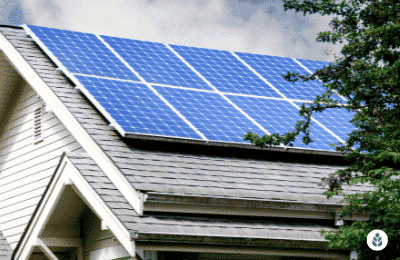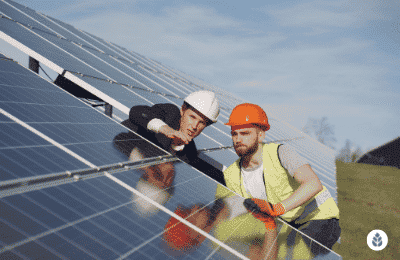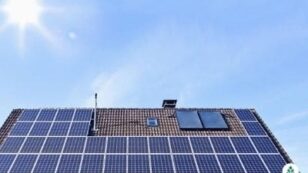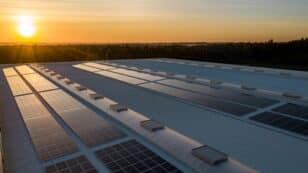 Reviews
Reviews
Louisiana Solar Incentives (Rebates, Tax Credits & More in 2024)
In this guide to reducing solar conversion costs using solar incentives in Louisiana, you’ll learn:
- What solar incentives are available in Louisiana?
- How much can you save by taking advantage of the solar incentives in Louisiana?
- What are the most beneficial solar perks to take in Louisiana?
Each product and or company featured here has been independently selected by the writer. You can learn more about our review methodology here. If you make a purchase using the links included, we may earn commission.
Do Louisiana Solar Incentives Make It Affordable for Homeowners to Go Solar?
Yes, absolutely. Although converting to solar will always be expensive, the available solar incentives in Louisiana can help reduce your effective system costs by thousands.
Most residents pay around $42,375 for their solar energy systems in Louisiana, which is about $12,000 higher than the national average. The cost per watt for photovoltaic (PV) panels in the area is slightly above average at $3.39, and a 12.5 kilowatt (kW) system is required to offset the high energy needs in the area. This is quite large compared to the average U.S. system size of 9.5 kW.
Unfortunately, the state doesn’t have a Renewable Portfolio Standard (RPS). These goals push renewable energy sources and are often the catalyst for incentive programs to be created and offered to solar customers.
Still, there are several perks available in The Pelican State, with the overall benefit being in line with what you’d see in most other states.

Solar Alternatives

Regional Service
Average cost
Pros
- Great warranty coverage
- Outstanding customer service
- Multitude of products and services
Cons
- No leases or PPAs

South Coast Solar

Regional Service
Average cost
Pros
- Outstanding customer service
- Offers products from leading manufacturers
- Great warranty coverage
Cons
- Expensive
- No leases or PPAs
The table below includes a quick look at all of the perks available to you to help make PV equipment more affordable and more valuable. We’ll include an expected savings as well to help you prioritize which will be the most beneficial.
| Solar Incentives in Louisiana | Incentive Type | Description | Occurrence | Estimated Dollar Amount You Can Receive |
| Federal Solar Investment Tax Credit (ITC) | Federal | Offers a credit to your income tax liability for 30% of your total cost for converting to solar. Unused credit can be pushed to future tax years. | One-time: The credit is determined once when you first file your taxes after installation. However, unused credit can carry over for up to five years. | $12,713, on average |
| Solar Energy System Exemption | State | This is an exemption for property taxes that prevents your taxes from going up following solar installation | Ongoing: This benefit gets applied once per year for as long as your system holds value — an estimated 20 years. | $4,661, on average — savings vary based on system value |
| Home Energy Loan Program (HELP) | State | Provides low-interest solar loans for up to $12,000. Down payment requirements are also minimal. | One-time: Benefits are assessed once when you finance your system, but savings can add up over time | Varies based on your system cost, how much you finance and more |
| Net Metering | Local | Credits customers for excess energy produced and sent to the grid. Net energy metering is mandated in the state for most electric companies, but it may not be available to you | Always in Effect: For customers who have access to this perk, credits for excess power will always be accruing | Varies based on your monthly energy consumption, your system size and more |
| Local Incentives | Local | Benefit programs offered by cities and local utility companies | Varies based on the incentive | Varies based on the incentive, your system size and more |
What Do Louisianians Need to Know About the Federal Solar Tax Credit?
The federal solar tax credit has been around since 2005. As a perk offered by the federal government, it’s available to all U.S. residents. It was originally scheduled to drop from 30% to 26% in 2022, with an additional reduction to 22% in 2023 before being discontinued in 2024.
The current rate schedule was dictated by the Inflation Reduction Act (IRA), which was signed by Congress in August of 2022. The IRA increased the rate for all solar installations in 2022 — retroactively and for the remainder of the year — back up to 30%, and it extended the program in its entirety to 2034. The new schedule for rate reductions is as follows:
- 30% for installations completed through 2032
- 26% for installations completed in 2033
- 22% for installations completed in 2034
- The credit will no longer be available beginning in 2035 unless Congress renews the bill again
As a tax credit, the percentage of your system cost gets applied to your income tax burden for the year you convert to solar energy. For Louisianans, that’s an average of $12,713. This assumes the typical system total of $42,375 and a 30% credit for an installation completed before or in 2032.
How to Claim the Federal ITC in Louisiana
Claiming the federal credit couldn’t be much easier, which is a big part of why it’s such a successful and beneficial program in the area. You can follow the steps below to make sure you take full advantage of this perk.
- Step 1: After you install your system and are ready to file your taxes for the year your equipment was commissioned, print out IRS form 5695. This form is for reporting residential energy credits for energy efficiency upgrades, including solar installation.
- Step 2: Fill out the form. You should be able to complete this step in just a few minutes. You’ll need some basic information about the size and cost of your system, the address where it was installed and the solar contractor that carried out the work.
- Step 3: Submit the form alongside your taxes, or provide the form to your accountant for proper filing.
If you use TurboTax, H&R Block or some other tax software to file your taxes, you should automatically get a prompt about clean energy equipment you had installed in the previous year. You can skip printing the form in that case and just answer the related questions within the software.
EcoWatch’s Opinion on the Federal ITC in Louisiana
The federal credit is, in our opinion, the best incentive you can take. It not only provides the greatest potential return — an average of over $12,713 — but it also requires just a few minutes to apply for.
This perk is outstanding, especially in areas that lack a state tax credit and sales tax exemptions. Unlike some of the local benefit programs we’ll discuss later, this perk is also available to all residents, which is a plus.
While this is our favorite solar perk in the area, you should keep in mind that it will only provide actual value if you owe money on your income taxes. Since it’s a credit and not a solar rebate, you’ll only see the effective savings if you owe at least $2,542 per year for the five years following your installation.
Watch Below: Is Solar Actually Worth It? What’s True vs What’s a Myth
What You Should Know About the Solar Energy System Exemption in Louisiana
Whenever you carry out a home improvement that raises the value of your home, you should expect your property taxes to go up as a result. This is because your assessed value for taxation is based on the total value of your land and any improvements on it.
Since converting to solar boosts home value by an average of 4.1%, PV panels should theoretically cause your taxes to go up.1 Thankfully, this exemption prevents that from happening.
The actual amount you’ll save will vary based on several factors, including your local property tax rate — certain municipalities assess taxes separately from the state — and the value your system adds to your home.
While it’s challenging to account for the value depreciation of your equipment, the theoretical savings are equal to the property tax rate multiplied by your system value.
With solar systems in Louisiana costing around $42,375 and a state property tax rate of 0.55%, the average savings per year comes out to $233.2 For the 20 years your system is expected to hold value, that’s a total savings of $4,661.
How to Claim the Property Tax Exemption in Louisiana
One of the best parts about the state exemption for property taxes is that it’s automatic and doesn’t require any application process. Your tax assessor will see permits for your solar array but will ignore the value it adds to your property when assessing your taxes.
EcoWatch’s Opinion on Louisiana’s Property Tax Exemption for Solar Equipment
Property tax exemptions for solar are common perks throughout the country, and they’re a great way to reduce the all-in cost of converting to solar, in our opinion. We love to see perks like this that are automatic and don’t require any effort or time to apply for.
This perk is less valuable in areas like The Pelican State, where property tax rates are unusually low, but it still offers savings with no action on your part, which is great. Plus, the total savings is substantial over time.
What You Should Know About the Home Energy Loan Program (HELP) in Louisiana
This program is designed to make solar financing more accessible by reducing down payment requirements and keeping interest rates as low as possible. Ultimately, the HELP program can mean the difference between being able to convert to solar power and not having access to renewable energy at all.
The loan program is made available to all taxpayers throughout the state, and funding can cover up to $12,000 worth of the system cost. If you include the federal credit, this program can bring your effective up-front cost down to around $17,000, which is much more reasonable.
This program is available for solar panel installation as well as other energy efficiency home improvements.
How to Claim the HELP Program in Louisiana
Claiming the HELP program benefits is a straightforward process, although it can be a bit time-consuming. You can follow the steps below to take this perk.
- Step 1: Head over to the State of Louisiana Department of Natural Resources (DNR) web page for HELP applications.
- Step 2: Click on “Participating Lenders” to see which financiers can assist you with a HELP loan. You’ll need to choose one of the lenders prior to moving forward with the installation process.
- Step 3: Continue with installing your solar project. Your financier may have restrictions on installation companies, so be sure to check with a representative before moving forward.
EcoWatch’s Opinion on Louisiana’s HELP Program
Solar is expensive in the south, where hot summers often drive up electricity consumption and demand larger and costlier PV systems. Many Louisiana residents struggle to justify the $40,000-plus required to convert to solar, which is why solar financing options like the HELP program are so useful in the area.
We love to see beneficial solar financing options like this, as they make solar a more accessible and realistic option for many homeowners. Although you might spend some time and energy applying and moving through the process, we believe it’s well worth it for the potential savings you’ll see by converting to solar.
Net Energy Metering in Louisiana
Net energy metering is a billing policy mandated by many Public Utilities Commissions (PUC) across the country. It tracks energy flowing from the grid to your home when your panels aren’t producing enough to sustain your energy demands, as well as excess energy your panels generate and send to the grid.
A net metering policy dictates how you’re credited for the energy you send to the grid and applies those credits to future electric bills to keep your monthly expenditure and effective electricity rates down.
Net energy metering maximizes your long-term energy savings, which also means it can help you pay off your PV panels more quickly. According to the Solar Energy Industries Association (SEIA), it has historically been one of the most beneficial programs for solar customers in the country.3
Net energy metering (NEM) is now mandated by the Louisiana Public Service Commission for all investor-owned utilities (IOUs) and electric cooperatives, except for Entergy New Orleans. The credit rate is set at the avoided cost rate, which is below the retail value for electricity. This isn’t ideal, but it’s certainly better than nothing and should still help you push toward or above the average solar savings in the state of $17,256.
We should also mention that net energy metering is changing for the worse in many other states. Some are dropping the policy altogether, while others are moving from mandatory retail rates to below-retail rates. The future of NEM is unknown at this point, but many states seem to be moving away from it.
How to Enroll in Net Energy Metering in Louisiana
The application process for NEM depends on your electric company, but most have a straightforward form you can fill out for enrollment if it offers the program at all. In many cases, solar customers won’t need to fill out the form, as their installer will take care of it. You can follow the steps below to ensure you take NEM if your utility provider offers it.
- Step 1: Contact your electric company and ask them to install a bidirectional electric meter if they haven’t already. This should be done at no cost to you.
- Step 2: When you’re choosing from one of Louisiana’s best solar panel installation companies, confirm that a representative from the company will take care of the application process for you.
- Step 3: Continue with the installation.
- Step 4: We suggest that you check your electricity bills for a month or two following the completion of your solar project. Look for credits accruing or reductions to your energy bills. Report any issues you notice to your installer.
EcoWatch’s Opinion on Net Energy Metering in Louisiana
Net energy metering is hugely beneficial for solar customers, especially in areas like LA, where energy consumption is well above average.4 If the program is available to you, we absolutely recommend you take advantage of it. It can help maximize your energy savings over time and reduce the payback period for your solar panel system costs.
We’d love to see NEM at the retail rate. This would help solar customers save far more over time.
Local Solar Incentives in Louisiana
In addition to looking into the above federal and statewide programs, we suggest seeing if you are eligible for local incentives. We’ll include all of the perks available in your area below, along with a short description of how each can benefit you.
- New Orleans Solar for All (NOLA): The Solar for All NOLA program is available to low-income New Orleans residents. The program is designed to provide affordable solar lease options with no down payment options.5 While we don’t typically suggest going with a solar lease or power purchase agreement (PPA), this program does help make solar more accessible to those who cannot afford a cash purchase or qualify for a PV loan.
- City of New Orleans Net Metering: This is a mandated net energy metering program for customers of Entergy New Orleans. This is an outstanding perk to take advantage of, as it guarantees you the full retail rate for each kilowatt-hour (kWh) you overproduce and send to the electric grid.
There may also be energy efficiency rebate programs for things like solar water heaters, smart thermostats, heat pumps and other upgrades. We recommend checking on the Database of State Incentives for Renewables & Efficiency (DSIRE) to see if there are other perks available from your utility provider.
Which Tax Incentives Are The Best In Louisiana?
We’ve discussed all of the solar benefit programs that make converting to solar worthwhile in Louisiana. Below, we’ll include some insight into which we believe are the most valuable and the ones that we think you should definitely not miss out on.
The Federal Tax Credit
First and foremost, we strongly recommend you take the federal credit, even if you don’t apply for any other perks. This single benefit program provides a potential savings from converting to solar of $12,713 on average in your area. Despite the financial incentive being so massive, the credit takes just a few minutes to apply for.
Plus, the credit is available to all residents, unlike some of the local perks, like net energy metering.
The Home Solar Loan (HELP) Program
The HELP program is another one we recommend considering if you plan to finance your panels. Solar financing is helpful because of the well-above-average cost of solar panels in the area, and it can make the difference between affording solar and not converting at all.
The HELP program is also a great option because of the low down payment requirements and the low interest rates. These can tip the scales in some cases and make financing available where leases and PPAs would otherwise be the only options.
Leases and PPAs are far less beneficial over time, as the all-in savings are lower, and you never own your system outright. Plus, financing allows you to take the federal credit, whereas leases and PPAs do not.
Net Energy Metering
Finally, net energy metering is an outstanding perk to take if it’s available to you. It can help push you toward the average long-term savings of $17,256 or beyond that, especially if your energy company offers the full retail value for credits.
The only reason we don’t rate this perk any higher is that it’s not available to all customers, and it isn’t set at the retail rate for electricity.
What’s The Near Term Outlook For More Incentives In Louisiana?
As of this writing, there are no plans for new incentives to become available, and there is no indication that the existing perks will become more beneficial in the near future.
However, the state doesn’t have an RPS in place, and establishing one is expected to create new perks and enhance the ones that are already available. There is no evidence that an RPS will be set anytime soon, but if it is, you can expect some additional incentives to pop up.
The cost information presented in this article is derived from a comprehensive analysis, incorporating data from multiple industry sources. The average cost per watt per state was calculated based on figures from Consumer Affairs, Energy Sage, and Berkeley Lab’s Electricity Markets & Policy Department. Additionally, monthly energy consumption and the average monthly cost of electricity were sourced from the U.S. Energy Information Administration, ensuring a well-rounded and accurate representation of the information presented.
FAQ: Solar Incentives LA
Below, we’ll answer some of the most commonly asked questions we see about solar benefit programs from residents in your area.
At this time, there are no plans to increase incentives for solar systems in the next two years. As mentioned above, the state doesn’t have an RPS, and until it does, there is little incentive to offer new perks or upgrade the existing ones. If an RPS is set, then there might be additional incentives available, depending on how aggressive it is.
The biggest impact the IRA had on the solar industry was to the federal credit. It pushed the credit rate for systems commissioned in 2022 from 26% up to 30%, including systems installed in 2022 before August, when the bill was signed. The IRA also pushed the expiration date for the program forward by an entire decade.
Additionally, the IRA increased tax credits for some makes and models of electric vehicles (EVs). The maximum rate now sits around $7,500, although it depends on the type of EV you purchase.
Solar Renewable Energy Certificates (SRECs) are credits that your solar power system earns for you for each kWh it produces. The credits are earned regardless of how the energy is used, and they are entirely separate from net energy metering credits. The credits can be sold for a profit in areas where SREC markets are active and open.
Unfortunately, SRECs are not available in Louisiana. They’re typically found in states with progressive RPS goals, so they’re not an option in The Pelican State.
There is no evidence to suggest that incentives for solar systems will decrease in the next two years. The only change we can foresee would be a discontinuation of the HELP financing program, which we don’t expect anytime soon. It’s also possible that the exemption for property taxes will be removed, but this isn’t a common occurrence in the U.S.
Top Solar Installers in Louisiana Cities
Comparing authorized solar partners
-
- Great warranty coverage
- Outstanding customer service
- Multitude of products and services
- No leases or PPAs
A+Solar Veteran
Having trouble deciding? Click below and use our process to receive multiple quotes instead:

 233k
233k  41k
41k  Subscribe
Subscribe 





